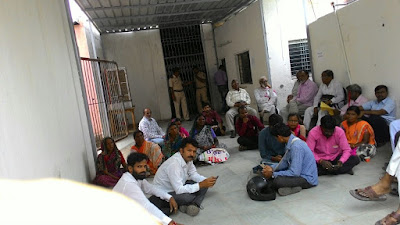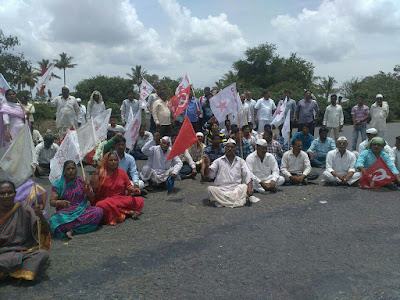The
joint peasant struggle in Maharashtra, which began with the novel peasant
strike on June 1, reached a new crescendo on August 14, the eve of Independence
Day. By a happy coincidence, August 14 was also the 111th birth
anniversary of the legendary leader of the historic Warli Adivasi Revolt in
Thane district and former AIKS national president Godavari Parulekar.
The
Coordination Committee of Farmers’ Organisations had given a clarion call in
the last of the 15 large district conventions held from July 10 to 23, which
mobilised over 40,000 peasants, to block all national and state highways across
the state on August 14.
The
main demands of this sustained struggle were complete peasant loan waiver
excluding the richer sections, which the state government had promised during
negotiations with the Coordination Committee on June 11 and which it had
betrayed within a fortnight, implementation of the recommendations of the
Swaminathan Commission, particularly the one about ensuring Minimum Support
Price (MSP) for agricultural produce at one and a half times the cost of
production, radical changes in the fraudulent Pradhan Mantri Fasal Bima Yojana
which is meant to enrich the corporates and fleece the peasants, removal of the
ban on the cattle trade, halt to unjust land acquisition in the Mumbai-Nagpur
Samruddhi Highway, Mumbai-Delhi Industrial Corridor, Mumbai-Ahmedabad Bullet
Train and such other projects, old age pension to peasants and agricultural
workers, waiving of arrears of electricity bills and expansion of irrigation
facilities.
MAGNIFICENT
PARTICIPATION
Responding
to this call, over 1,60,000 peasants blocked national and state highways (Chakka
Jaam) for hours together in at least 183 centres in 27 districts of
Maharashtra. These figures could well be higher, since highways were blocked
spontaneously by peasants in several centres even where there was no peasant
organisation to lead them. That was the most remarkable feature of this
struggle. In several centres thousands of peasants were shown to have been
arrested, since the police just had no machinery to actually arrest such a huge
mass.
Another
significant feature was that nearly half of the total participation in this
mass action was of the AIKS, which mobilised over 75,000 peasants in this
struggle in 22 districts. It may be recalled that the AIKS had the largest
total mobilisation in the 15 district conventions in July as well.
At
the same time, other farmers’ organisations like Swabhimani Shetkari
Sanghatana, Shetkari Sanghatana, Prahar Shetkari Sanghatana, AIKS (Ajoy
Bhavan), Baliraja Shetkari Sanghatana, Satyashodhak Shetkari Sabha, Lok Sangharsh
Morcha, Shetkari Sabha and many other groups also mobilised well. Both the
print and electronic media covered this action excellently.
The
districts with the largest total participation were: Ahmednagar - 39,000,
Thane-Palghar – 25,000, Parbhani – 20,000, Nashik – 12,000, Beed – 10,000,
Nandurbar – 10,000, Dhule – 7000, Amravati – 5,000 and Kolhapur – 5,000.
The
districts with the largest AIKS participation were: Thane-Palghar – 25,000,
Ahmednagar – 13,000, Nashik – 10,000, Parbhani – 10,000 and Beed – 6,000. Leaders
and activists of the CITU, AIAWU, AIDWA, DYFI and SFI also participated in the
struggle in several places. The SFI and DYFI led an independent and effective campaign
in rural areas around the slogan ‘We are Children of Peasants’ in support of the
peasant struggle in educational institutions and areas in the state.
All
the leaders of the Coordination Committee – Convenor Dr Ajit Nawale, Raju
Shetty MP, Raghunathdada Patil, Bachhu Kadu MLA, Jayant Patil MLC, J P Gavit
MLA, Dr Ashok Dhawale, Kisan Gujar, Namdev Gavde, Raju Desle, Kishor Dhamale,
Pratibha Shinde, Sushila Morale, Sanjay Patil, Karan Gaikar and many others led
the road blockade actions at various places across the state.
STATE
REPRESSION
On
Independence Day, August 15, the Coordination Committee had given another call.
It had said that the national flag at the district headquarters should be
hoisted not by the guardian ministers, the policies of whose government were
responsible for the rising spate of suicides of debt-ridden peasants, but by
toiling peasants themselves.
Accordingly,
in many places this attempt was made but it was crushed through state
repression. In two places, Parbhani and Ahmednagar, the police resorted to
brutal lathi charges and hundreds of peasants were arrested. Among those
arrested were AIKS state general secretary Dr Ajit Nawale, Balasaheb Patare,
Subhash Lande, Sanjeev Bhor, Mahesh Nawale and others at Ahmednagar and AIKS
state joint secretary Vilas Babar, Rajabhau Rathod and others at Parbhani,
while AIKS leaders Limbaji Kachre, Ramkrishna Shere, Uddhav Poul, Anjali Babar,
Rameshwar Poul, Ramdas Poul and many others were lathi charged at Parbhani.
While the Ahmednagar peasant leaders were released in the evening, Vilas Babar
and Rajabhau Rathod of Parbhani are still in custody seven days later.
In
Sangli, AIKS state treasurer Umesh Deshmukh and Swabhimani Shetkari Sanghatana
leader Mahesh Kharade were picked up by the police from their homes on the
morning of August 14 itself and were thrown into police lock-up till the
evening of August 15. This was the third time during this peasant struggle that
the police in Sangli resorted to this repression against peasant leaders.
In
Nashik also, AIKS and AITUC leader Raju Desle, Prakash Chavan, Nana Bachhav,
Karan Gaikar, Ganesh Kadam, Anil Bhadange, Dattu Bodke and others were picked
up on August 14/15 and were released on the evening of August 15.
On
behalf of the Coordination Committee, AIKS national joint secretary Dr Ashok
Dhawale immediately released a statement denouncing the BJP-led state
government for resorting to arrests and lathi-charges on peasants on
Independence Day, on top of its betrayal of its own assurances.
CHIEF
MINISTER RATTLED
The
magnificent peasant response elicited by the August 14 statewide Chakka Jaam
call rattled the ruling BJP and especially its Chief Minister Devendra
Fadnavis. On August 17, in his speech at the meeting of the BJP state executive
in Mumbai, he lashed out for half an hour in a completely unbalanced fashion at
the Coordination Committee and its leadership. He accused the peasant struggle
of trying to create anarchy by making the demand for a complete loan waiver; he
came down on the Left leadership by making the time-worn and silly charge that
these are the people who open their umbrellas when it rains in China; and in a
pseudo-nationalist move that the BJP-RSS leadership nowadays always falls back
upon, he branded the call to let toiling peasants hoist the national flag instead
of guardian ministers as sedition. He also came down heavily on the media for
giving wide coverage to the peasant struggle and also for focusing on the
corruption scandals involving some BJP ministers, sarcastically saying that
their ‘shops’ don’t run without such tantalising news against the government! His
speech clearly betrayed the growing nervousness of the powers that be at the
growing response to the peasant struggle.
Convenor
Dr Ajit Nawale immediately hit back at the Chief Minister and released a video
recording which was shown simultaneously alongside the Chief Minister’s speech
in the Marathi electronic media the same evening and was published in the print
media the next day. In the video, Dr Nawale made the following points: Such
unbalanced reactions of the CM will not solve the peasants’ problems, only a
change of policies will; Struggling for peasant demands is not sedition,
following policies that lead to suicides of thousands of peasants is sedition; If
the demand for peasant loan waiver spreads anarchy, was the chief minister who
regularly used to make the same demand when he was in the opposition spreading
anarchy?; If demanding peasant loan waiver is sedition and anarchy, is giving
loan waivers and tax concessions to the tune of lakhs of crores of rupees to
corporates patriotism and good governance?; Those who stayed away from the freedom
struggle and thus actually helped the British imperialists have no right to
lecture us on patriotism; Those who refused to unfurl the national flag on the
RSS headquarters till 2001 have no right to teach us about the sanctity of the
national flag for which we have fought and sacrificed from the days of the
freedom struggle.
The
AIKS state council met briefly on August 19 at Solapur to review this struggle
and to plan for the future. It congratulated all AIKS activists throughout the
state for their consistent initiative and sterling contribution. The next
meeting of the Coordination Committee will be held soon to decide the future
course of action.
Ashok Dhawale
Amravati
Aurangabad
Beed
Beed
Kolhapur
Nanded
Nashik
Palghar
Wada, Palghar











